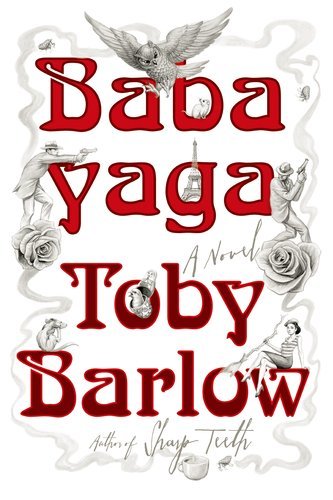 |
“Babayaga,” by Toby Barlow(MCT Information Services) |
Before “Babayaga,” I thought Disney had captured all the world’s folk tales and remade them as child-friendly blockbusters. But author Toby Barlow got to Baba Yaga ― fearsome witches plucked from old Russian legend ― first, and he brings them to life in 1950s Paris.
At the center of the novel is Will, a young American ad man who is not a witch. He’s enjoying the pleasures of the city, although he’ll probably soon be heading home to Detroit. He’s a likable, drifting twentysomething, the kind of guy who might meet a fellow expat in a bar and tag along for an evening of drinking and wooing girls.
Enter Zoya, whom Will pursues avidly ― thanks in part to her spells, woven because she likes him, too. Dark-haired, blue-eyed and big-bosomed, Zoya is with an older lover in the book’s first pages, post-coital, worried that he’s finally noticed she hasn’t aged in decades. She looks sweet, but she’s innately dangerous: She swiftly dispenses with the old man by impaling his head on a spike.
She learned everything she knows from Elga, an ancient, evil crone. With an apartment crammed with potions, a black rat for a familiar and a decidedly nasty disposition, Elga is a witch in the classic mode. Just to keep things interesting, she’s got a modern touch or two: For a jolt of energy, she snorts dried, powdered snake.
When Zoya’s indiscretely disposed lover leads a police detective named Vidot to Elga’s door, the elder witch flies into a fury and turns him into a flea. Yes, a flea.
As with any good farce, the plot isn’t really the point, but it can best be described as a tangle of pursuits. Elga seeks revenge on Zoya, the police try to find Vidot, Vidot wants to be human again, and enchanted Will and Zoya chase each other. Meanwhile, Will’s expat friend Oliver (the one he went drinking with) runs a literary journal by day and is a CIA operative by night; he soon sweeps Will up in his Cold War shenanigans.
All of this could be a hot mess, but Barlow is adept at combining unexpected genres: His first novel, “Sharp Teeth,” was about werewolves in Los Angeles, told entirely in verse. On his second time out as a novelist, Barlow easily keeps all the balls in the air (while balancing on stilts and whistling a happy tune). The blend of James Bond, folk tale, Gogol’s humor and surrealism with a corny French detective and a young man’s love story all improbably works.
The voice of this book is straightforward, light and warm. Stuck on a stuffy subway, Will “distracted himself by recalling the night he met Zoya on the metro. He remembered her little smudge of a black eye, how surprising it had been when she spoke to him and how he’d thought about asking her out for a drink but hadn’t, because he’d been too tired. He suspected that would be the scene he took home with him as his mental postcard of Paris, a vision of talking with a pretty girl alone at night on an empty train.” And where Will is full of feeling, the police detective Vidot can’t help be funny: He’s upstanding, valiant, proud, slightly pretentious ― while being a flea.
Barlow goes all-in on each story line: Poor Vidot hitches his way across the city on the bellies of dogs, an adventure relayed with great physical detail. Will and Oliver try to deliver the CIA goods amid a baffling scrim of double crosses that tap dances among a mysterious pharmacy, a jazz trio, a pair of Russian assassins and a blond American WASP. Will and Zoya connect, explicitly; the book isn’t coy about sex. The witches’ history unfolds richly, too.
To propel things along, the ghosts of three witches, old colleagues of Elga and Zoya’s, comment on the events like a Greek chorus. In verse, of course.
Writing these free-form poems, some of which go on for pages, is something an author undertakes only if it’s fun. A real joy in the storytelling process comes through as well in the whimsical detours and characterizations.
As literary nerds will recognize, Oliver’s ridiculous dual life ― a government agent who runs a literary journal ― is a riff on the Paris Review. One co-founder, Peter Mattheissen, was actually in the CIA. Another, the writer George Plimpton, served as the model for the charismatic spy with an endless supply of anecdotes.
When Barlow began writing fiction, he has said, he was “blessed by Plimpton’s spirit of making the impossible possible.” This book continues in that tradition: It’s an absurd hybrid that winds up as a bewitching caper novel.
By Carolyn Kellogg
(Los Angeles Times)
(MCT Information Services)




![[Herald Interview] 'Trump will use tariffs as first line of defense for American manufacturing'](http://res.heraldm.com/phpwas/restmb_idxmake.php?idx=644&simg=/content/image/2024/11/26/20241126050017_0.jpg)

![[Health and care] Getting cancer young: Why cancer isn’t just an older person’s battle](http://res.heraldm.com/phpwas/restmb_idxmake.php?idx=644&simg=/content/image/2024/11/26/20241126050043_0.jpg)

